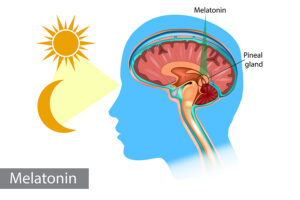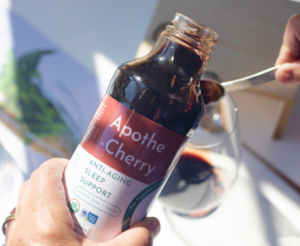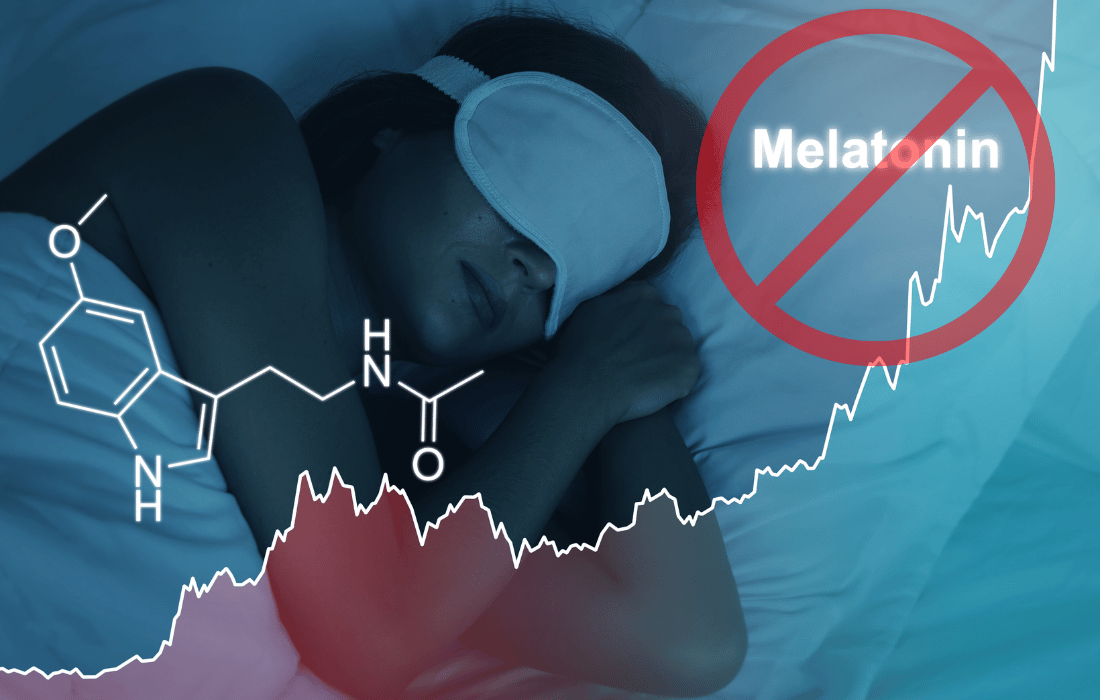Let’s be honest, sleep is one of those things we take for granted until it becomes an issue. And when sleep isn’t happening, we start to scramble, searching for solutions. One of the most popular remedies floating around the internet and medicine cabinets these days is melatonin supplements. They’re touted as a quick and easy fix for sleep problems, right? But here’s the thing: just because it’s a ‘natural’ hormone doesn’t mean it’s great for your long-term health when taken in pill form.
In this article, I’m going to break down why popping melatonin pills might not be the best idea for your hormonal health in the long run. Sure, it may help you sleep tonight, but at what cost to your body’s natural rhythms?
What Is Melatonin?
First off, let’s talk about what melatonin actually is. Melatonin is a hormone that your body produces naturally in the pineal gland, located in the brain. Its primary role? To help regulate your sleep-wake cycle, also known as your circadian rhythm. When the sun goes down and darkness sets in, your body ramps up melatonin production, signaling that it’s time to wind down and eventually fall asleep.

But here’s the kicker: when you start taking melatonin supplements regularly, your body’s natural ability to produce melatonin could get thrown off balance. In other words, relying on external sources of melatonin can trick your body into thinking it doesn’t need to produce as much of it naturally.
The Problem with External Melatonin
The biggest issue with taking melatonin supplements is that it can interfere with the natural hormone production cycle in your body. Essentially, your body gets a free pass from doing its job because you’re handing it what it needs in pill form. Over time, this can lead to a dependency where your body becomes less efficient at producing melatonin on its own.
Suppression of Natural Melatonin Production
There’s a term called “exogenous hormone suppression,” which refers to the phenomenon where external sources of hormones suppress your body’s natural production. This is well-documented in the case of testosterone, estrogen, and even cortisol. Melatonin is no different.
According to a study published in Frontiers in Endocrinology, long-term use of melatonin supplements can disrupt the feedback loop between your brain and pineal gland, leading to decreased natural production. When you stop taking melatonin, your body might struggle to get back into its normal rhythm, leaving you worse off than before you started supplementing.
The biggest issue with taking melatonin supplements is that it can interfere with the natural hormone production cycle in your body. Essentially, your body gets a free pass from doing its job because you’re handing it what it needs in pill form. Over time, this can lead to a dependency where your body becomes less efficient at producing melatonin on its own.
Our Hormones Are Like a Symphony
Think of your body’s hormones as a beautifully orchestrated symphony. Each hormone plays a vital role, coming in at just the right moment to keep your body running smoothly, from regulating sleep and energy to mood and metabolism. Melatonin, like all hormones, is part of this intricate orchestra. When your body produces hormones endogenously (from within), it maintains a delicate balance, ensuring each hormone performs its role in harmony with the others.
But when you start introducing external (exogenous) sources of hormones—whether it’s melatonin supplements, testosterone replacement therapy, or estrogen therapy—you’re essentially adding a new player to this symphony, one that isn’t following the natural rhythm. Just like adding an extra instrument out of sync, this can throw everything off balance.
Altering Your Natural Cycles
When you rely on external melatonin, it sends a signal to your body that it no longer needs to produce as much on its own. Similar to what happens with testosterone replacement therapy (TRT) or estrogen supplementation for women, exogenous hormone use can alter the body’s feedback loop. This is the system your body uses to regulate hormone levels—kind of like your body’s thermostat for hormones. If your body senses it’s getting enough melatonin from an external source, it stops producing as much on its own. Over time, this disruption can make it harder for your body to regulate itself naturally.
For instance, in the case of TRT, men who take external testosterone often see a reduction in their own testosterone production. When they stop taking the supplement, it can take a long time for their natural levels to return to normal—if they do at all. The same can happen with estrogen in women; long-term reliance on external sources can disrupt natural hormone production and lead to hormonal imbalances.
Hormonal Imbalance and Other Side Effects
Let’s take a closer look at how this impacts your overall hormonal health. When your body’s natural production of melatonin is suppressed, it can throw off other hormonal processes too. The endocrine system is interconnected, and when one hormone is out of whack, others can be affected as well. Melatonin, for example, influences cortisol levels, the hormone responsible for managing stress.
Here are some other potential side effects of prolonged melatonin use:
- Mood swings and irritability: Since melatonin is involved in regulating mood, consistently altering its levels can make your mood more unpredictable.
- Disrupted fertility: Melatonin is intricately linked with reproductive hormones like estrogen and progesterone. A study in the Journal of Clinical Endocrinology found that high doses of melatonin might interfere with ovulation and fertility.
- Impaired thyroid function: Melatonin interacts with the thyroid gland, and too much supplemental melatonin may decrease thyroid hormone levels, leading to hypothyroidism symptoms like fatigue and weight gain.
The Role of Light in Melatonin Production
One of the main reasons people feel the need to take melatonin supplements is because their natural sleep-wake cycles are out of sync. And one of the biggest culprits for this? Artificial light, especially blue light. Blue light exposure, particularly from screens, suppresses melatonin production.
A study published in Chronobiology International found that exposure to blue light in the evening can delay melatonin production by up to two hours. So, instead of reaching for melatonin pills, the real fix might be as simple as limiting screen time before bed or using blue-light-blocking glasses.
Long-Term Use and Hormonal Health Risks
Taking melatonin in the short term isn’t the end of the world, but what happens when it becomes a nightly ritual? Prolonged use has been associated with a number of risks, particularly concerning hormonal balance and sleep disorders.
Dangers of Overuse
Desensitization: When you take melatonin over an extended period, you run the risk of desensitizing your receptors to the hormone. This makes them less responsive to both the supplemental and naturally-produced melatonin.
Overdose risk: While it’s difficult to overdose on melatonin, taking too much can cause symptoms like headaches, dizziness, and even nightmares. Moreover, it can disrupt the delicate hormonal interplay in your body, throwing your circadian rhythm even further out of balance.
Risk of Dependency
Just like any other sleep aid, there’s the risk that you’ll come to rely on melatonin to fall asleep. Over time, this can create a vicious cycle where your body is no longer capable of producing enough melatonin to help you sleep naturally. A Journal of Sleep Research article emphasized that chronic melatonin use might lead to dependency, where users find it increasingly difficult to fall asleep without the supplement.
Better Alternatives to Melatonin Supplements
Now, if taking melatonin supplements isn’t the answer, what is? Fortunately, there are several natural ways to boost your body’s melatonin production without the need for melatonin pills or drops.
1. Sun Exposure
Remember, melatonin production is tied to the light-dark cycle. Getting enough natural sunlight during the day can help regulate your circadian rhythm, making it easier for your body to produce melatonin at night. Aim for at least 30 minutes of sunlight exposure every morning to signal to your body that it’s daytime and to kickstart your melatonin production for the evening.
2. Limit Blue Light at Night

We’ve already mentioned how blue light disrupts melatonin production. Try reducing your exposure to artificial light at least two hours before bed. If you can’t avoid screens, consider investing in blue-light-blocking glasses or using apps like f.lux, which adjusts the lighting on your devices to mimic the natural day-night cycle.
3. Optimize Sleep Environment
Creating a sleep-friendly environment can make all the difference. Keep your room dark, cool, and quiet. Even tiny amounts of light can reduce melatonin production, so blackout curtains or an eye mask can be a game-changer.
4. Dietary Support
Certain foods can naturally boost melatonin production. Foods rich in tryptophan, like turkey, nuts, seeds, and dairy, act as precursors for melatonin. In addition, magnesium-rich foods such as spinach, pumpkin seeds, and almonds can help your body relax, making it easier for your natural melatonin to kick in.
Tart Cherry Juice: A Natural Alternative to Boost Melatonin
Now, here’s a natural alternative that might surprise you: tart cherry juice. If you’ve never heard of it, tart Montmorency cherries are known for their rich phytochemical content, including melatonin—a hormone crucial for regulating sleep.
A 2012 study published in the European Journal of Nutrition titled “Effect of tart cherry juice (Prunus cerasus) on melatonin levels and enhanced sleep quality” explored the impact of tart cherry juice on melatonin levels and sleep patterns. The study involved 20 healthy adults who were given either tart cherry juice concentrate or a placebo over seven days.
The Findings
The results were impressive. The study found that participants who consumed tart cherry juice had significantly elevated levels of urinary melatonin, compared to those who took the placebo. This increase in melatonin was linked with improvements in sleep duration and efficiency. Participants reported spending more time in bed, experiencing longer total sleep time, and having better sleep efficiency.
While the study didn’t show significant changes in the timing of melatonin’s circadian rhythm, there was a trend toward higher mesor and amplitude—both of which indicate enhanced melatonin activity. This means that tart cherry juice may be a natural and effective way to support your body’s melatonin production without the downsides of synthetic supplements.
Apothe-Cherry: A Concentrated Tart Cherry Solution
If you’re looking for an even more concentrated form of tart cherry, Purium’s Apothe-Cherry is a great option. Apothe-Cherry is a tart cherry extract that condenses the nutritional benefits of approximately 30 sour/tart cherries into a single ounce of concentrate. It offers a potent dose of phytonutrients and antioxidants in an easy-to-consume format.
 Why Apothe-Cherry?
Why Apothe-Cherry?
What makes Apothe-Cherry stand out is its sole ingredient—tart cherry extract. Tart cherries are known for containing melatonin, which can help balance your circadian rhythm and improve sleep. Beyond just sleep, tart cherries also provide:
- Ellagic Acid: An antioxidant that can inhibit the production of lipopolysaccharide, which plays a role in acute inflammatory reactions.
- Anthocyanin: A flavonoid that improves low-density lipoprotein oxidation, supporting cardiovascular health.
- Healthy uric acid metabolism: Tart cherry extract has been linked to supporting healthy joint function and recovery, as well as a healthy response to inflammation.
The rich, deep pigmentation of tart cherries provides an array of antioxidants, and the concentrated format of Apothe-Cherry ensures you get all the benefits, even when cherries aren’t in season.
When Is Melatonin Useful?
While I’m clearly not a big fan of long-term melatonin use, I do think it has its place in very specific situations. For instance, melatonin can be helpful for:
- Jet lag: Short-term use after crossing time zones can help reset your body’s internal clock.
- Shift work: For those whose jobs require them to work odd hours, melatonin can help regulate their sleep schedules.
- Children with specific sleep disorders: In some cases, melatonin is used as a short-term solution for children with developmental disorders who struggle with sleep.
However, even in these cases, melatonin should be seen as a temporary fix, not a long-term solution.
Conclusion: Take Control of Your Sleep Naturally
In the end, melatonin supplements can be a useful tool in very specific situations, but relying on them for the long haul can lead to disruptions in your natural hormone production. Instead of popping a pill, consider tackling the root causes of your sleep issues. Whether it’s improving your sleep environment, reducing blue light exposure, or simply getting outside more, there are plenty of natural ways to boost your body’s melatonin production without throwing your hormones out of whack.
If you’re looking for a natural alternative, consider trying tart cherry juice or concentrated products like Purium’s Apothe-Cherry, which have been shown to support melatonin production and improve sleep quality. Our bodies are incredibly capable when given the right environment and tools to function properly. Taking control of your sleep naturally not only benefits your sleep quality but also keeps your hormones—and overall health—in check.
Sleep well, but sleep naturally.












